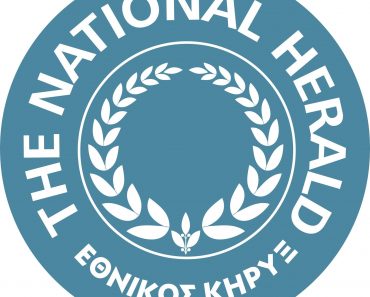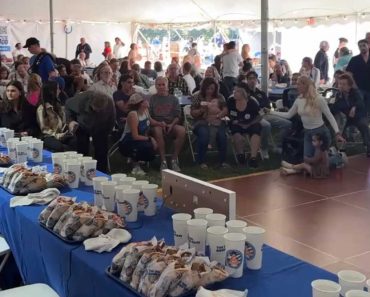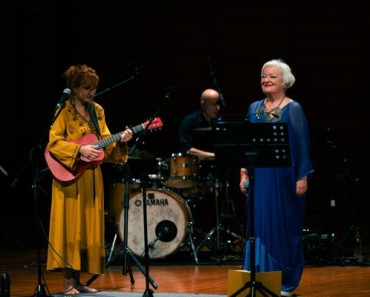
Suzanne Stewart
Staff Writer
Most of my articles have a quick turnaround. I go to an event, meeting or have an interview and the resulting article is published in the next edition of The Pocahontas Times.
This article began in March.
That is when I attended Galaxycon in Richmond, Virginia. There were several celebrities I was excited to meet – Dulé Hill, best known for his role as Gus, in “Psych;” Harvey Guillén, who played Guillermo on “What We Do in the Shadows;” and Cary Elwes, Westley, from “The Princess Bride,” – his line was too long.
I met two of those three and they were awesome. At the top of my list was Chris Sarandon, well known actor who portrayed Prince Humperdink in “The Princess Bride” and provided the voice of Jack Skellington in “Nightmare Before Christmas.”
He also happens to be from West Virginia.
I spoke to him at his booth, but unfortunately, couldn’t do an interview that day due to the crowd waiting to see him. I resigned myself to only getting an autograph and having a few minutes of conversation when he pulled out his phone and gave me contact information.
Sarandon said to get in touch with his lawyer and set up an interview. I was ecstatic. After several months and emails, we finally set a time, and we had a great conversation about his life in West Virginia and the amazing career he has had as an actor.
Sarandon was born to Greek immigrants and raised in Beckley in an idyllic setting where everything was within walking distance.
“I walked to every school I went to,” he said. “My elementary school, Institute School, was up the hill from our house. Beckley Junior High School was in the other direction, but the same kind of walk and then Woodrow Wilson High School was across the street from my elementary school.
“It was a very contained, safe feeling environment,” he continued. “You didn’t worry about going out by yourself when you were a kid.”
Go out by himself he did and often. Sarandon remembers days when he would leave the house at nine in the morning and not be back until five that afternoon. If his mother needed him home, all she had to do was blow a whistle.
“My mother had a whistle, and she blew the whistle when it was time to come home,” he said. “I was within distance of hearing the whistle – almost always – except if I was down the street to visit my friends, Phil Halloran and Mike Massinople, who lived further away.”
Sarandon said he sort of lived two lives. At home, the family spoke Greek and ate Greek food – except when he was at his father’s restaurant which served American food – and when he was at school or with friends, he was the all-American boy.
“I had a very lovely upbringing in a beautiful town,” he said. “At the same time, it was also different in the sense that my family spoke Greek at home when I was a kid, so I spoke it when I was little. I’ve lost most of it now, sadly and regrettably. I lived a kind of bifurcated existence.”
This double role life was a beginning of sorts to Sarandon’s acting career. Like most children, he acted in plays and made up characters with friends. He also entertained adults at his church with his knack for accents and telling stories and jokes.
He was also musical. He was a member of his church choir and a rock n’ roll band with friends. They were called The Teen Tones, and they performed on local radio and TV stations.
“Often, we were bookended by other musicians who were country musicians or quote, end quote, hillbilly musicians,” he said. “It was really bluegrass. We shared a studio with Lester Flat, Earl Scruggs and the Foggy Mountain Boys.
“Suddenly, I saw and felt the great musical tradition of the state and that it was something to be proud of,” he continued. “Really proud of and also how it connected to my heritage because the music was not that different from the old, very old Greek music.”
After graduating high school, Sarandon enrolled at West Virginia University where he got a scholarship for winning an extemporaneous speech competition.
He calls going to WVU one of the greatest decisions of his and his parents’ lives.
“I was very concentrated on achieving when I first got to college,” he said. “I got good grades – I was a straight A student. I was on kind of a political path. I was in a fraternity and the politics at WVU. At the time the fraternities controlled a lot of what was going on because they got the vote. It was like a union in a way.”
Sarandon served on several committees at that time. He coordinated homecoming weekend his sophomore year and was coordinator of the leadership conference.
It was also in his sophomore year that he was discovered, in a way. He took an acting class led by Professor Charles Neal.
“Chuck Neal – to him I’m forever indebted – because he pulled me aside at one point after working in the class for a semester, doing scenes and what have you and he said, ‘you know, you’re really good at this; if you don’t follow this path, you’re going to regret it for the rest of your life,’” Sarandon recalled.
Neal cast Sarandon in “Julius Caesar” and as the title character of Tartuffe, which was the spark that led him on the acting path.
“I got to wear a fake nose and a wig, and be somebody else, and I loved it,” he said. “I have no idea what inspired me, but lightning struck. I said, ‘this is my calling; this is what I was meant to do.’”
Sarandon dropped out of his fraternity and focused on acting at that point. He graduated from WVU with a degree in speech and decided he needed to go to graduate school. He enrolled at Catholic University in Washington, D.C. and joined the theater department.
His father gave him some money which he used to buy a car and he sold paperback books to pay for his tuition.
The theater department focused on classical plays and toured for eight months out of the year.
“I auditioned and got into the touring company and toured the country the next year,” Sarandon said. “I was the lighting director, truck driver and also played Romeo.”
The group logged 38,000 miles in two station wagons and a truck, as they performed at high schools, colleges and community venues.
After earning his master’s degree, Sarandon joined a local summer theater and later, worked for a company of actors who worked out of a church in Georgetown, while his fiancée, Susan, finished her final year at CU.
“It was a magic time in my life and then at the end of that year, when Susan graduated, I auditioned for something called the Theater Communications Group, which is the consortium of all the regional theaters in. the country,” he said.
The couple moved to Connecticut and started auditioning for plays. They did an audition together and were both signed by an agent. They then moved to New York and started working.
Sarandon worked on Broadway shows and had a small part on a soap opera. He said he “was on the show maybe two times a week and had one line, but it paid the rent.”
Not all auditions went in his favor. As with all actors, you don’t get booked for everything you audition for, but Sarandon worked through the rejection and in his early 30s, he booked his first film role, as Leon in “Dog Day Afternoon”.
The part was a supporting role, but it had a big impact on the film. Sarandon was nominated for an Academy Award for his characterization of Leon, the husband of Al Pacino’s character, Sonny.
There is a particularly powerful scene in the film where Leon and Sonny have their final conversation on the phone. Sonny has held up a bank and kept the workers hostage and Leon is brought from the hospital by police to a barbershop across the street to talk to Sonny.
While the scene was scripted, parts of it were improvised by the two actors. They read through the scene and felt it was too melodramatic, so, using what they knew about the men their characters were based on, they started the conversation in a different way.
“We just started riffing and the first thing that came to mind was, ‘hi, how you doing?’” Sarandon said. “They haven’t seen each other for years and they drop right into who they were to a certain extent, and then who they became as well, because they have an argument.”
Director, Sidney Lumet, liked the route they were taking and recorded them doing the improv and after reviewing it, the final scene included parts of the improv along with what was in the script.
Sarandon continued to build his résumé from there and was cast in horror films “Fright Night” and “Child’s Play,” as well as fantasy and adventure film turned cult classic “The Princess Bride.” He was also cast as the voice of the main character in “Nightmare Before Christmas,” a stop-motion animated film that has a huge fan base.
“For Nightmare Before Christmas,” Sarandon said they were looking for an actor whose voice was similar to that of composer Danny Elfman, who was the singing voice of Jack Skellington. Sarandon’s vocal timbre matched, and he was cast as the Pumpkin King of Halloween Town.
Making the film was a very long, drawn out process. Sarandon would record a couple scenes, then the animators filmed those parts. Once they were complete, he would return to the recording studio to do more scenes.
“It was an extraordinarily agonizing process for the animators because literally, they were shooting one frame at a time in order to put together the movement of the various characters with all the other movement that’s going on,” he said. “In particular, the big scenes where there are lots of characters interacting. It’s crazy. I don’t know how they did it, but they did.”
The only part of the film Sarandon saw before he recorded his lines were the musical parts. The crew animated to Elfman’s voice and so he was able to see Jack Skellington, but otherwise, he was in the booth alone, acting.
Then there was “The Princess Bride.” It may not have been popular when it first came out, but it wasn’t long before the film – based on the book by the same name, written by William Goldman – gained a cult following.
After nearly 40 years, the film is still a fan favorite, and those fans travel far and wide to see the actors at conventions all over the country. It has been passed down from generation to generation, like a well-loved stuffed animal that has been in the family for decades.
Sarandon credits the film’s success to the story and the many genres that come together to make a one-of-a-kind movie experience.
“It’s very romantic,” he said. “It’s also a great adventure movie. It’s a thriller in a way. It’s a comedy in a way and it mixes all those genres and, somehow, it works,” he said.
He recalled his audition and how he thought it didn’t go well because director Rob Reiner and writer Goldman broke out into laughter.
“I thought, ‘oh my God, this is a serious scene, why are they laughing at me?’” he said. “Then I thought, no, ‘comedy is serious business.’ Let the lines do the work. Let the dialogue do the work. Let the character’s behavior of taking that moment seriously do the work because part of what’s funny is that he takes it seriously.”
The comedy is in the delivery. Prince Humperdink is very serious, and sinister, so when he says lines like, ‘I’ve got my wife to murder, Guilder to frame for it, I’m swamped,’ in a serious way, it has an absurd and funny tone, as well.
“I think that’s what appeals to people and in particularly, as you get older, you recognize more of what’s unique about the movie,” he said. “When a little kid watches the movie, basically it’s the kissing and the sword fighting and the giant – my kids were enthralled with the giant.
“Then as you get older, you start getting some of the jokes,” he continued. “Some of the inferences. Some of the twists and it’s something that reengages you. Also, there’s a lot of really repeatable stuff. Wally Shawn says he can’t go anywhere without people coming up to him and saying ‘Inconceivable.’
“It was definitely fun to film. We had a great time shooting.”
Sarandon has spent more than half of his life acting and has enjoyed every single moment of it. He continues to travel to conventions to meet fans of his work and continues to find work that he enjoys.
He recently joined the podcast genre with his own show, “Cooking by Heart.” The first three seasons are available on his website, chrissarandon.com
The idea for the podcast came about during the COVID-19 pandemic. He was talking to his brother-in-law, who is also in the industry, about what they could do during the lockdown and the BIL told him he should do a cooking podcast.
Sarandon said he didn’t want it to be like other cooking podcast, so while it does involve sharing recipes, the podcast also focuses on the people and their stories behind the food they grew up with and the food that shaped them.
“I had to find something that was unique to me,” he said. “Well, it’s right there – you grew up in a restaurant. So, it’s about what it was like with my guests growing up around food. What was it like in their house. The important thing in the podcast, there are always stories and people. It’s not just about the food.”
Guests include chefs, actors, writers, musicians and friends from Sarandon’s circle. It also includes other celebrities from West Virginia, such as Kathy Mattea and Brad Dourif.
Sarandon said now that season three of the podcast is done, he is stepping back to take a break. He has nine grandchildren he wants to spend more time with and a garden to tend.
“Right now, I’m gardening,” he said. “I’m a huge gardener. Fresh foods are very important.”
As he reflects on his life and the career he has had, Sarandon said the foundation he got from growing up in West Virginia was integral.
“I’m always thankful that it was part of my life,” he said.
“The first twenty-one years of my life was in West Virginia.”







